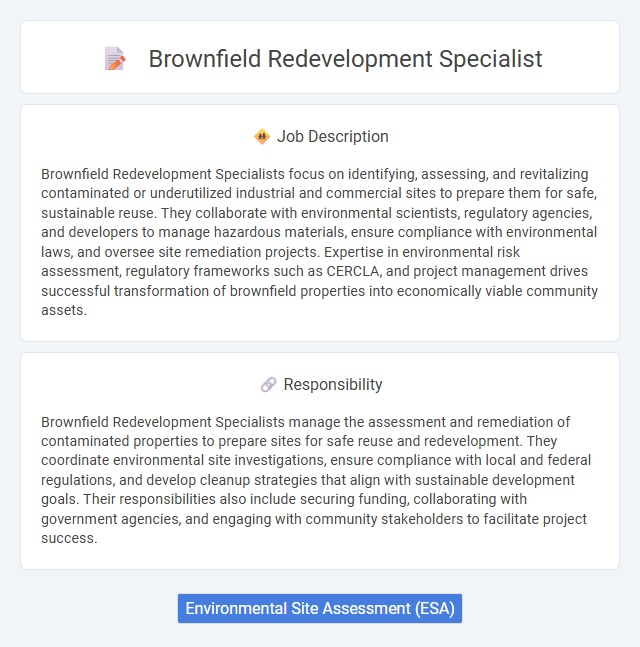
Brownfield Redevelopment Specialists focus on identifying, assessing, and revitalizing contaminated or underutilized industrial and commercial sites to prepare them for safe, sustainable reuse. They collaborate with environmental scientists, regulatory agencies, and developers to manage hazardous materials, ensure compliance with environmental laws, and oversee site remediation projects. Expertise in environmental risk assessment, regulatory frameworks such as CERCLA, and project management drives successful transformation of brownfield properties into economically viable community assets.
Individuals with strong problem-solving skills and a passion for environmental sustainability are more likely to be suitable for a Brownfield Redevelopment Specialist role. Candidates comfortable with analyzing complex site conditions and coordinating with regulatory agencies have a higher probability of thriving in this position. Those who prefer routine tasks or lack interest in environmental regulations might face challenges adapting to the dynamic nature of brownfield redevelopment projects.
Qualification
A Brownfield Redevelopment Specialist requires expertise in environmental science, urban planning, and hazardous waste management, typically holding a degree in environmental engineering, geology, or a related field. Proficiency in site assessment techniques, knowledge of regulatory frameworks such as CERCLA and RCRA, and experience with remediation technologies are essential. Strong project management skills and familiarity with community engagement and funding mechanisms enhance effective redevelopment and site reuse.
Responsibility
Brownfield Redevelopment Specialists manage the assessment and remediation of contaminated properties to prepare sites for safe reuse and redevelopment. They coordinate environmental site investigations, ensure compliance with local and federal regulations, and develop cleanup strategies that align with sustainable development goals. Their responsibilities also include securing funding, collaborating with government agencies, and engaging with community stakeholders to facilitate project success.
Benefit
Brownfield redevelopment specialists likely enhance urban revitalization by transforming contaminated sites into usable properties, increasing real estate value and community appeal. Their expertise probably reduces environmental risks, improving public health and safety while attracting investment and job creation. Companies and municipalities may benefit from regulatory compliance and potential financial incentives linked to sustainable redevelopment projects.
Challenge
Working as a Brownfield Redevelopment Specialist likely involves navigating complex environmental regulations and addressing contamination issues, which can pose significant challenges. Balancing stakeholder interests and securing funding for remediation projects may frequently complicate redevelopment efforts. Success in this role probably depends on strong problem-solving skills and the ability to coordinate multidisciplinary teams effectively.
Career Advancement
Brownfield Redevelopment Specialists leverage expertise in environmental assessment and remediation to transform contaminated sites into viable commercial or residential properties, enhancing urban renewal. Career advancement opportunities include roles such as Environmental Project Manager, Urban Planner, or Sustainability Director, often requiring expanded skills in project management and regulatory compliance. Certification in areas like the American Board of Industrial Hygiene or Leadership in Energy and Environmental Design (LEED) can significantly boost prospects for senior positions and consultancy roles.
Key Terms
Environmental Site Assessment (ESA)
Brownfield Redevelopment Specialists conduct Environmental Site Assessments (ESA) to identify potential contaminants on previously developed lands, ensuring compliance with environmental regulations. They analyze soil, water, and air samples while reviewing historical site usage to evaluate contamination risks and remediation needs. Their expertise supports sustainable redevelopment by mitigating environmental hazards and facilitating safe property reuse.
 kuljobs.com
kuljobs.com